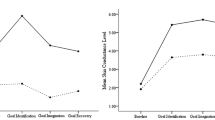Abstract
Although studied extensively in depressed populations, the implications of goal appraisals for bipolar disorder are not well understood. Four hundred sixty-four college students completed questionnaires measuring personal goal appraisals (a modified version of B. R. Little's, 1989, Personal Projects Analysis), history of bipolar disorder symptoms, and current symptoms of hypomania and depression. Participants endorsing hypomania symptoms or current positive affect tended to construe goals in a positive manner, as likely to be attained, enjoyable, controllable, and not difficult or stressful. A history of clinically significant hypomania symptoms, however, correlated with negative, pessimistic goal appraisals. This relationship could be explained in a mediational model by higher current depression among those with previous hypomania/mania. Discussion highlights the potential of studying bipolar disorder from a goal theoretical perspective.
Similar content being viewed by others
REFERENCES
Altman, E. G., Hedeker, D., Peterson, J. L., & Davis, J. M. (1997). The Altman Self-Rating Mania Scale. Biological Psychiatry, 42, 948-955.
Baron, R. M., & Kenny, D. A. (1986). The moderator-mediator variable distinction in social psychological research: Conceptual, strategic, and statistical considerations. Journal of Personality and Social Psychology, 51, 1173-1182.
Beck, A. T., Steer, R. A., & Brown, G. K. (1996). Manual for the Beck Depression Inventory-II. San Antonio, TX: Psychological Corporation.
Beck, A. T., & Weishaar, M. E. (1995). Cognitive therapy. In R. J. Corsini & D. Wedding (Eds.), Current psychotherapies (5th ed., pp. 229-261). Itasca, IL: Peacock.
Depue, R. A., Krauss, S., Spoont, M. R., & Arbisi, P. (1989). General Behavior Inventory identification of unipolar and bipolar affective conditions in a nonclinical university population. Journal of Abnormal Psychology, 98, 117-126.
Dion, G. L., Tohen, M., Anthony, W. A., & Waternaux, C. S. (1988). Symptoms and functioning of patients with bipolar disorder six months after hospitalization. Hospital and Community Psychiatry, 39, 652-657.
Dozois, D. J. A., Dobson, K. S., & Ahnberg, J. L. (1998). A psychometric evaluation of the Beck Depression Inventory-II. Psychological Assessment, 10, 83-89.
Emmons, R. A. (1992). Abstract versus concrete goals: Personal striving level, physical illness, and psychological well-being. Journal of Personality and Social Psychology, 62, 292-300.
Emmons, R. A., & King, L. A. (1988). Conflict among personal strivings: Immediate and long-term implications for psychological and physical well-being. Journal of Personality and Social Psychology, 54, 1040-1048.
Hyland, M. E. (1987). Control theory interpretation of psychological mechanisms of depression: Comparison and integration of several theories. Psychological Bulletin, 102, 109-121.
Johnson, S. L., & Kizer, A. (2002). Bipolar and unipolar depression: A comparison of clinical phenomenology and psychosocial predictors. In I. H. Gotlib & C. L. Hammen (Eds.), Handbook of depression (pp. 141-165). New York: Guilford.
Johnson, S. L., Ruggero, C. J., & Carver, C. S. (2003). Cognitive, behavioral, and affective responses to reward: Links with hypomania symptoms. Manuscript submitted for publication.
Johnson, S., Sandrow, D., Meyer, B., Winters, R., Miller, I., Keitner, G., et al. (2000). Increases in manic symptoms after life events involving goal attainment. Journal of Abnormal Psychology, 109, 721-727.
Leahy, R. L. (1999). Decision-making and mania, Journal of Cognitive Psychotherapy, 13, 83-105.
Lecci, L., Karoly, P., Briggs, C., & Kuhn, K. (1994). Specificity and generality of motivational components in depression: A personal projects analysis. Journal of Abnormal Psychology, 103, 404-408.
Little, B. R. (1983). Personal projects: A rationale and method for investigation. Environment and Behavior, 15, 273-309.
Little, B. R. (1989). Personal Projects Analysis: Trivial pursuits, magnificent obsessions, and the search for coherence. In D. M. Buss & N. Cantor (Eds.), Personality psychology: Recent trends and emerging directions (pp. 15-31). New York: Springer-Verlag.
Lozano, B. E., & Johnson, S. L. (2001). Can personality traits predict increases in manic and depressive symptoms? Journal of Affective Disorders, 63, 103-111.
Lyon, H. M., Startup, M., & Bentall, R. P. (1999). Social cognition and the manic defense: Attributions, selective attention, and self-schema in bipolar affective disorder. Journal of Abnormal Psychology, 108, 273-282.
Manji, H. K., & Lenox, R. H. (2000). The nature of bipolar disorder. Journal of Clinical Psychiatry, 61 (Suppl. 13), 42-57.
Rehm, L. P. (1977). A self-control model of depression. Behavior Therapy, 8, 787-804.
Reilly-Harrington, N. A., Alloy, L. B., Fresco, D. M., & Whitehouse, W. G. (1999). Cognitive styles and life events interact to predict bipolar and unipolar symptomatology. Journal of Abnormal Psychology, 108, 567-578.
Stern, G. S., & Berrenberg, J. L. (1979). Skill-set, success outcome, and mania as determinants of the illusion of control. Journal of Research in Personality, 13, 206-220.
Author information
Authors and Affiliations
Corresponding author
Rights and permissions
About this article
Cite this article
Meyer, B., Beevers, C.G. & Johnson, S.L. Goal Appraisals and Vulnerability to Bipolar Disorder: A Personal Projects Analysis. Cognitive Therapy and Research 28, 173–182 (2004). https://doi.org/10.1023/B:COTR.0000021538.34160.52
Issue Date:
DOI: https://doi.org/10.1023/B:COTR.0000021538.34160.52




